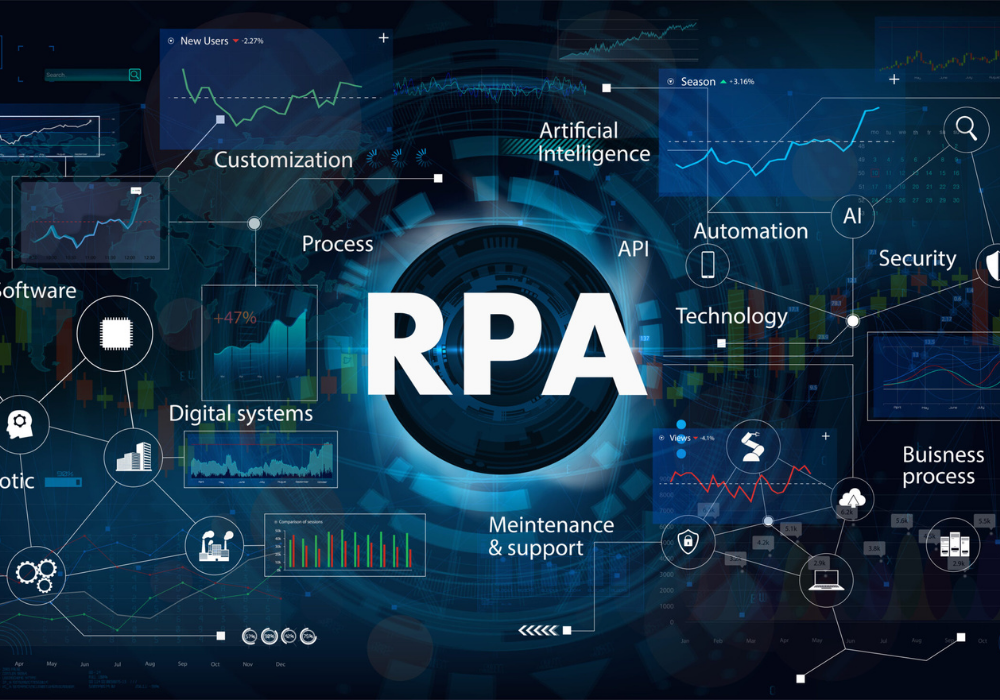Automating Regulatory Compliance in Finance

Automating Regulatory Compliance in Finance For finance teams, staying compliant with a long list of regulatory requirements is crucial but can feel overwhelming. Every transaction, report, and audit must follow regulatory guidelines can be severe. Luckily, automation has become a game-changer in helping finance departments keep on top of these regulations with far less hassle. Consistent Record-Keeping Automation ensures that every transaction is logged accurately and consistently, leaving no room for manual mistakes that can cause compliance headaches. By automating record-keeping, finance teams can track, sort, and archive records with precision, knowing that the information is accessible, accurate, and up to date. When regulations require data to be stored for certain periods or formatted in specific ways, automation keeps things in order and readily available. Real-Time Monitoring and Alerts Automated systems can monitor transactions in real-time and flag anything unusual that might indicate non-compliance. These automated alerts make it easier to catch errors or inconsistencies before they turn into bigger problems. For example, if a transaction looks suspicious or doesn’t align with compliance standards, the system can pause the transaction or alert the team to check it out. This kind of real-time monitoring helps keep everything in line, allowing the team to step in and take action before issues escalate. Efficient Audit Trails One of the biggest compliance challenges in finance is creating clear, accurate audit trails for every process. Automation streamlines this by logging every action taken, creating an accessible history for auditors. This instant visibility is invaluable during audits when clear records and transparency are key to compliance. With automation, audits can be handled much more efficiently, and there’s less scrambling to gather and verify documentation. Automated Reporting and Filing With RPA, companies can set up systems that automatically handle regular compliance reporting and filing. This not only ensures accuracy but also saves time by reducing manual data entry and preparation. Whether it’s generating financial statements or filing specific compliance forms, automated reporting keeps the process timely and accurate, meaning compliance deadlines are less stressful and reporting requirements are always met. Enhanced Data Security Meeting regulatory requirements in finance often means maintaining strict data security standards. Automated compliance systems help by enforcing secure access controls, encrypting sensitive information, and ensuring that data handling complies with standards like GDPR. Automation also reduces the chance of manual errors leading to security breaches, keeping data safer and compliance simpler. By taking the pressure off finance teams, automation allows them to manage compliance in a more reliable, efficient, and stress-free way. Accurate records, real-time alerts, audit-ready trails, and enhanced security all combine to create a robust compliance environment that can keep up with the fast-evolving regulatory landscape in finance.
How Automation Reduces Errors and Saves Time

How Automation Reduces Errors and Saves Time Finance teams often juggle numbers, deadlines, and a boatload of regulations that can make anyone’s head spin. With so many things to balance, it’s easy for tiny errors to creep in. And in finance, even the smallest slip-up can cause big headaches! Enter automation—a streamlined way to handle the tedious, error-prone stuff so humans can focus on the more meaningful work (and maybe enjoy a bit of breathing room, too). Real-Time Reporting for Quick Decisions With bots gathering data on a continual basis, automated systems can offer real-time reporting. Imagine being able to make an important business decision based on current data instead of waiting for the end-of-quarter reports. Automation gives finance teams the tools to make quicker, smarter decisions based on live information, without the bottlenecks of manual data processing. Saying Goodbye to Manual Errors Automating financial reporting means setting up bots to do all the repetitive, detailed tasks, such as data entry and transaction validation. These bots follow a set of rules, pulling info from various systems, checking for any discrepancies, and ensuring the numbers always add up. Because they’re programmed to operate with a high degree of precision, they avoid the small mistakes that can occur manually like typing an extra zero or misplacing a decimal point. Fewer errors mean less rework and a whole lot less stress when it comes to finalizing financial reports. Speeding Up Processes Without Losing Accuracy Let’s face it—reporting cycles can be painfully long, especially when everyone’s checking and double-checking for mistakes. Automation speeds things up by handling these processes in the blink of an eye. Bots can pull data, run calculations, and generate reports in minutes, not hours or days. That extra time saved means finance teams can focus on deeper insights or planning the next steps rather than endlessly cross-checking spreadsheets. Boosting Compliance with Less Hassle In finance, compliance is king. Automated systems are set up to keep everything in line with regulatory requirements. That means not only are records accurate, but they’re also automatically organised for audits. Having automated, accurate, and ready-to-go records is like an accountant’s dream come true—and it saves everyone a lot of panic during audit season. By taking on repetitive, error-prone tasks, automation allows finance teams to get more done, more accurately, and without the hassle. With fewer errors, faster reporting, and easy compliance, the whole department becomes a well-oiled machine—and that’s something everyone can appreciate!
Improving Payroll Accuracy and Compliance Through RPA

Improving Payroll Accuracy and Compliance Through RPA Let’s face it: payroll is one area where there’s zero room for error. Missteps can lead to some seriously unhappy employees and potential compliance headaches. RPA (Robotic Process Automation) steps in as the ultimate payroll assistant, working quietly behind the scenes to ensure everything from tax withholdings to deductions and overtime calculations is spot on, every single time. Accurate Payments, Every Paycheck Instead of relying on manual data entry (and all the errors that can creep in), automated bots handle payroll data with precision. They pull info directly from attendance systems, employee records, and tax tables, leaving HR teams with confidence that each paycheck is calculated accurately. Bots are tireless—so whether it’s end-of-month crunch or last-minute changes, they keep payroll accurate and on track. Tax Compliance and Timely Filing Tax laws can be complex and ever-changing, and keeping up with them can feel like a full-time job. RPA makes sure payroll processes align with the latest tax regulations by automatically updating rates and checking calculations. For companies with employees across different states or countries, bots can handle multiple tax codes and compliance rules, easing the administrative burden of cross-border payroll. Efficient Reporting and Record-Keeping RPA doesn’t just pay people—it’s also a superstar for record-keeping and reporting. From generating payroll reports to tracking historical data, automated systems make it easy to access accurate payroll information when needed. Audits become far less stressful, as every transaction is meticulously logged and easily traceable. Employee Satisfaction with On-Time, Error-Free Payments At the end of the day, employees want to be paid accurately and on time. Automated payroll ensures there are no surprises, which helps build trust and keeps morale high. Employees can check their statements knowing the numbers add up, and HR can rest easy knowing everyone’s been paid right.
Employee Onboarding and Offboarding with RPA

Employee Onboarding and Offboarding with RPA Employee onboarding is a busy time for HR, and RPA makes it smoother by handling the admin-heavy tasks with accuracy and speed. When a new hire joins, automated bots can send out the welcome email, set up their system access, update HR systems with their details, and even order equipment like laptops and ID badges. All these processes, which might normally involve a bunch of back-and-forth emails and data entry, happen seamlessly with RPA—so new hires are set up and ready from day one. Document Collection and Compliance Collecting and verifying documents, like IDs and signed contracts, is a key part of onboarding. RPA can help by sending reminders to new hires for any missing paperwork and tracking everything to make sure no forms slip through the cracks. Bots can also automatically upload files to the appropriate systems, keeping the HR team’s workflow clean and reducing the risk of misplacing essential documents. Training and Orientation Schedules RPA can take care of assigning training modules, setting up orientation sessions, and sending reminders for any required certifications. This automation ensures that every new employee receives the correct training and certifications, aligned with company policy. Instead of juggling multiple calendars and spreadsheets, HR can trust that new hires will be guided through their first weeks smoothly and consistently. Efficient Offboarding for Exiting Employees Offboarding involves multiple steps, like revoking system access, collecting company assets, and managing final payments. RPA bots handle all this automatically, so when an employee leaves, there’s no delay in deactivating accounts, stopping benefits, or processing their final paycheck. It helps avoid any security issues and ensures that each step is completed on time, without taking up HR’s day. Consistent Experience for Every Employee With RPA, the onboarding and offboarding experiences become consistent for every employee. No more worrying about steps getting skipped or delays in the process; bots follow the same protocol every time. This consistency not only makes things easier for HR but also leaves employees feeling valued and well-managed during these big transitions.
Automating Recruitment Processes with RPA in HR

Automating Recruitment Processes with RPA in HR Recruitment can be time-consuming and repetitive, especially when it involves sifting through countless resumes, coordinating schedules, and tracking metrics. With Robotic Process Automation (RPA), you can streamline these tasks and focus on what matters most—finding the best talent. Here’s how RPA can transform every stage of your recruitment process. Effortless Interview Scheduling Coordinating interview times across multiple candidates, interviewers, and rooms is challenging, but RPA makes it a breeze. Bots can handle the back-and-forth of setting up interview schedules, sending out calendar invites, and even sending reminders to both interviewers and candidates. This ensures the whole process runs smoothly, without endless email chains or double bookings. Automating Background Checks and Reference Collection For each candidate, RPA can initiate background checks and request references as soon as the candidate reaches this stage. The bot can track each step, updating HR when tasks are complete or when follow-ups are needed. This speeds up the entire verification process, reducing the wait time between final interviews and job offers. Handling Offer Letters and Onboarding Coordination Once a candidate accepts an offer, RPA can draft and send out the offer letter and employment contract, ensuring that every necessary document is properly prepared and signed. Additionally, RPA can kickstart the onboarding process by collecting the new hire’s details, setting up their accounts, and even initiating any necessary training modules, creating a smooth transition from candidate to employee. Keeping Recruitment Metrics on Track With RPA tracking every step, HR can gather valuable insights about recruitment timelines, candidate quality, and process bottlenecks. Bots collect data from each stage, so HR can analyse recruitment patterns, identify areas for improvement, and ensure that hiring targets are met.
Automating Employee Data Management for Better Insights and Efficiency

Automating Employee Data Management for Better Insights and Efficiency Is managing employee data starting to feel like herding cats? With constant updates, tracking changes, and the challenge of keeping records accurate, it can quickly become overwhelming. This is where automation steps in to keep everything on track by handling data entries, updates, and organising information all in one tidy digital space. By letting the bots take care of the basics, HR teams can breathe a little easier, with more time to focus on things that truly require a personal touch. Effortless Data Accuracy We’ve all been there: a misspelt name, an outdated address, or (heaven forbid) an incorrectly captured tax number. Automated systems mean employee data is entered and validated accurately, minimising those tiny but potentially costly errors. Regular updates can be scheduled to keep records current, saving teams from tedious double-checking. HR Insights at the Click of a Button Imagine pulling reports or analysing workforce trends without needing to dig through spreadsheets or bounce between multiple systems. Automated data management provides organised, real-time information with just a few clicks. HR can easily gain insights into turnover, training needs, and team growth—all without drowning in data entry. Privacy Compliance and Peace of Mind Keeping data secure and compliant is crucial (and sometimes overwhelming). Automation ensures data is handled according to company policies and regulatory requirements, reducing the risk of any security slip-ups. Sensitive information stays secure, allowing HR to focus on creating a workplace that values privacy. Enhanced Onboarding and Offboarding Automating data management isn’t just about keeping records; it transforms how HR interacts with new hires and departing employees. From pre-populating forms during onboarding to ensuring all necessary info is securely archived for offboarding, automation makes the process smoother for everyone involved.
What Industries Can Benefit from RPA?

What Industries Can Benefit from RPA? Robotic Process Automation (RPA) is revolutionising how businesses operate by automating repetitive, rule-based tasks. By doing so, it enhances efficiency, reduces manual errors, and cuts operational costs. While almost any industry can benefit from RPA, certain sectors are particularly well-suited to this technology. Below are some of the industries where RPA is making a significant impact: Financial Services The financial services sector, encompassing banking, insurance, accounting and investment management, is one of the leading adopters of RPA. Processes such as data entry, loan processing, claims management, and compliance checks can be automated, leading to faster transactions and improved accuracy. Key Benefits: Automates claims processing and underwriting. Enhances customer service through quick data retrieval. Improves compliance by ensuring consistent application of rules. Healthcare The healthcare industry often faces challenges with managing large amounts of patient data and administrative tasks. RPA helps streamline processes such as patient registration, appointment scheduling, and insurance claims processing. It also aids in maintaining compliance with healthcare regulations, such as data privacy laws. Key Benefits: Reduces administrative burden, allowing healthcare professionals to focus on patient care. Improves accuracy in billing and insurance claims. Enhances patient experience through faster appointment booking and reminders. Manufacturing Manufacturing companies often rely on precision and efficiency in their supply chain and production processes. RPA can assist with automating inventory management, order processing, and production planning. Additionally, it supports real-time monitoring of equipment and predictive maintenance, helping reduce downtime. Key Benefits: Increases production efficiency and resource utilisation. Automates inventory tracking and stock replenishment. Reduces the risk of production delays through real-time monitoring. Retail and E-Commerce RPA is transforming the retail and e-commerce industries by automating order processing, inventory management, and customer service tasks. It enables businesses to maintain accurate stock levels, manage supply chains more efficiently, and enhance the customer experience with faster order fulfilment. Key Benefits: Automates inventory updates and stock replenishment. Enhances customer service with automated order tracking and returns processing. Improves competitiveness through dynamic pricing adjustments. Legal Services The legal industry can benefit from RPA by automating contract management, document review, and compliance processes. It reduces the time spent on repetitive administrative tasks, allowing legal professionals to focus on more complex and strategic work. Key Benefits: Speeds up contract drafting and review processes. Ensures consistency and compliance with legal standards. Reduces the risk of processing / capturing errors in document management. Telecommunications Telecom companies are increasingly using RPA to manage large volumes of customer data and service requests. Automation can handle tasks such as customer onboarding, billing, and network management, helping improve service delivery and customer satisfaction. Key Benefits: Automates customer onboarding and service activation. Enhances billing accuracy and reduces payment processing times. Monitors network operations in real-time, identifying and addressing issues proactively. Public Sector Governments and public institutions are turning to RPA to improve the efficiency of their services. Automating tasks like processing permits, managing benefits, and handling tax filings helps reduce administrative delays and improve service delivery to citizens. Key Benefits: Speeds up permit and license processing. Reduces manual intervention in benefits management. Enhances accuracy and compliance in tax filings. Logistics and Supply Chain RPA is particularly beneficial for logistics companies, where speed and accuracy are critical. Automating tasks such as shipment tracking, inventory management, and invoice processing helps reduce operational costs and improve delivery times. Key Benefits: Enhances real-time visibility across supply chains. Automates shipment scheduling and tracking. Reduces delays by streamlining customs documentation and compliance. RPA is a versatile solution that can be tailored to fit the needs of a wide variety of industries. Whether it’s improving customer service, streamlining back-office operations, or optimising production lines, RPA has the potential to revolutionise business processes and deliver significant efficiency gains across the board. No matter your industry, it’s worth exploring how automation could benefit your organisation.
RPA for Dummies: A Simple Guide to Robotic Process Automation

RPA for Dummies: A Simple Guide to Robotic Process Automation In the world of business, efficiency and accuracy are paramount. Enter Robotic Process Automation (RPA), a technology that’s transforming how organisations operate. If you’ve heard of RPA but aren’t quite sure what it is or how it works, this guide is for you. Let’s break it down in simple terms. What is RPA? Robotic Process Automation (RPA) is a technology that uses software robots, or “bots,” to automate repetitive and rule-based tasks usually performed by people. These tasks can include anything from data entry and invoice processing to customer service and report generation. Think of RPA as a virtual assistant that can handle boring, time-consuming tasks so your employees can focus on more important work. Why Use RPA? Saves Time: Bots can work 24/7 without breaks, completing tasks much faster than humans. This means you can process more work in less time. Reduces Errors: Humans make mistakes, especially with repetitive tasks. RPA bots follow precise instructions, leading to fewer errors and greater accuracy. Cuts Costs: Automating tasks can lead to significant cost savings. Organizations can improve labour efficiencies and avoid mistakes that might be expensive to fix. Improves Compliance: RPA helps ensure that processes are followed correctly. Bots maintain detailed logs of every action, making it easier to comply with regulations. Enhances Employee Satisfaction: By automating tedious tasks, employees can spend more time on creative and value-adding initiatives, leading to higher job satisfaction. How Does RPA Work? Identify Tasks: The first step is to identify which tasks are suitable for automation. Ideal tasks for RPA are repetitive, rule-based, and high in volume. Design the Workflow: Once tasks are identified, the next step is to design a workflow. This usually involves mapping the as-is process, not just the automated parts, and ensuring all steps are considered before automation. Develop the Bot: Using RPA software, you can create a bot that follows the designed workflow. Many RPA tools use a drag-and-drop interface, making it easy to build bots without extensive coding knowledge. Test the Bot: Before fully deploying the bot, it’s essential to test it in a controlled environment. This helps ensure that it performs tasks accurately and as expected. Deploy and Monitor: Once testing is complete, the bot can be deployed. It’s crucial to monitor its performance and make adjustments as needed. Common Uses of RPA Data Entry: Automatically inputting data into systems, reducing the need for manual entry. Invoice Processing: Automating the handling of invoices, from receipt to payment. Customer Service: Using bots to respond to common customer inquiries or process requests. Report Generation: Automating the collection and analysis of data to create reports. Order Processing: Streamlining the order fulfilment process from order receipt to shipping. Challenges of RPA While RPA offers numerous benefits, there are also key factors to consider: Initial Investment: Implementing RPA may require upfront investment in software and training. Change Management: Employees may resist changes brought on by automation. Effective communication and training are crucial. Complex Processes: Not all processes are suitable for RPA. It works best with structured, repetitive tasks. Vendor Fit: Choose an RPA vendor that matches your business dynamic. Larger vendors aren’t always the best fit, especially for SMEs—opt for a provider who understands your specific needs and can offer tailored support. Conclusion RPA is a powerful tool that can help organizations enhance efficiency, reduce costs, and improve accuracy. By automating mundane tasks, businesses can empower their employees to focus on higher-value work, leading to innovation and growth. If you’re considering RPA for your organization, start by identifying repetitive tasks and exploring RPA solutions that fit your needs.
How RPA Can Help Your Organisation

How RPA Can Help Your Organisation In an increasingly competitive business landscape, organisations are constantly seeking ways to enhance efficiency, reduce costs, and improve customer satisfaction. Robotic Process Automation (RPA) has emerged as a powerful tool that can help achieve these goals by automating repetitive and time-consuming tasks. In this article, we’ll explore how RPA can benefit your organisation and transform the way you operate. Enhanced Operational Efficiency One of the most significant advantages of RPA is its ability to streamline operations.. By automating everyday tasks like data entry, invoice processing, and customer onboarding, organisations can empower their teams to dedicate more time to innovation, complex problem-solving, and value-driven initiatives. RPA bots can work around the clock, completing tasks more quickly and efficiently than manual processes, resulting in enhanced productivity and fewer operational bottlenecks. Cost Reduction Implementing RPA can lead to substantial cost savings for organisations. By automating repetitive tasks, companies can allow their teams to focus on higher-value, more meaningful work, boosting efficiency and reducing operational costs.. Furthermore, RPA minimizes errors that can lead to costly mistakes, such as financial discrepancies or compliance issues. The overall reduction in operational costs allows organisations to allocate resources more effectively and invest in innovation. Improved Accuracy and Compliance Manual processes are prone to error, but RPA significantly reduces the likelihood of mistakes, ensuring greater accuracy and consistency. Bots follow predefined rules and workflows, ensuring tasks are completed consistently and accurately. This level of precision is particularly crucial in regulated industries where compliance is paramount. RPA can help maintain audit trails and generate reports that demonstrate adherence to regulatory standards, reducing the risk of non-compliance. Scalability and Flexibility RPA solutions can easily scale according to your organisation’s needs. Whether you’re experiencing seasonal fluctuations or a sudden increase in workload, RPA can quickly adapt to changing demands. This scalability allows businesses to remain agile and responsive to market changes without the need for extensive workforce adjustments. Enhanced Customer Experience By automating processes that directly impact customer interactions, organisations can improve overall customer satisfaction. RPA can expedite response times for customer inquiries, streamline order processing, and provide timely updates. The result is a more efficient customer experience that fosters loyalty and drives repeat business. Data Insights and Analytics RPA not only automates tasks but also generates valuable data that can be leveraged for analytics. By capturing and analysing this data, organisations can gain insights into their operations, identify inefficiencies, and make informed decisions. This data-driven approach helps businesses stay ahead of the competition and adapt strategies based on real-time information. Empowering Employees While RPA handles repetitive tasks, employees can focus on higher-value work that requires critical thinking and creativity. This shift not only boosts employee morale but also fosters a culture of innovation. By empowering your workforce to engage in meaningful work, you can unlock their full potential and drive organisational growth. RPA Is The Future RPA presents a transformative opportunity for organisations looking to enhance efficiency, reduce costs, and improve overall performance. By automating repetitive tasks, companies can achieve greater accuracy, scalability, and customer satisfaction. Embracing RPA technology is not just about keeping up with the competition; it’s about positioning your organisation for long-term success in a rapidly evolving business environment. If you’re considering implementing RPA in your organisation, start by identifying processes that can benefit from automation and partner with a trusted RPA provider to develop a customized solution tailored to your unique needs.erhaps
Can RPA Increase a Business’s Profitability

Can RPA increase a businesses profitability? Document Management System (DMS) in addition to digitization and process automation to efficiently manage files.Document Management Data System Business Internet Technology Concept. In today’s competitive market, businesses are constantly seeking ways to enhance efficiency, reduce costs, and ultimately boost profitability. Robotic Process Automation (RPA) is an increasingly popular tool that allows organisations to automate repetitive, rule-based tasks, streamlining operations and freeing up key resources for more value-adding activities. But how does RPA directly impact profitability? Let’s explore the key benefits. Cost Reduction RPA significantly reduces operational costs by automating tasks that were previously handled manually. RPA bots can operate 24/7 making it a highly cost-effective solution. For example, in the financial sector, automating tasks like invoice processing or claims management can save hours of manual data entry, and minimising the financial losses. Improved Accuracy Errors in business processes can lead to costly delays, compliance issues, and damaged customer relationships. RPA eliminates these errors by following predefined rules and workflows, ensuring 100% accuracy. This improves the quality of outputs, reduces the need for costly error corrections, and enhances overall operational reliability. In the legal sector, automating tasks like contract review or document management ensures minimal mistakes, helping to avoid costly litigation or compliance breaches. Increased Efficiency and Productivity RPA enables businesses to complete tasks more quickly and accurately than ever. Tasks such as data entry, processing transactions, and generating reports can be completed in a fraction of the time. This improved efficiency allows employees to focus on more strategic initiatives, such as innovation, customer engagement, or business development. In retail, for instance, RPA can automate inventory management, ensuring that stock levels are optimised without the need for manual intervention, thus reducing waste and maximising sales opportunities. Enhanced Customer Experience RPA can significantly improve customer experience by automating routine tasks like answering FAQs, processing returns, or managing queries. This leads to faster response times, higher customer satisfaction, and increased loyalty, all of which contribute to improved sales and profitability. In e-commerce, for example, RPA bots can automatically update customers on the status of their orders, process refunds efficiently, and address common issues in real time, resulting in a smoother customer experience. Scalability As businesses grow, so do their workflows. RPA provides a scalable solution, enabling organisations to manage increased workloads without the need for additional resources. Bots can be quickly deployed and expanded to cover new tasks, allowing businesses to scale without proportionally increasing operational costs. For instance, logistics companies can use RPA to automate shipment tracking and order processing, handling increased demand during peak seasons Better Decision-Making In addition to automating tasks, RPA can help businesses collect and process data that can provide valuable insights. Automating data analysis enables businesses to gain real-time insights into performance, customer behaviour, and market trends, helping to optimise processes and identify new revenue streams. Manufacturers, for example, can use RPA to analyse production data and identify bottlenecks, allowing them to make data-driven decisions that enhance efficiency and profitability. Compliance and Risk Management Maintaining compliance with industry regulations is essential but can be costly and time-consuming. RPA automates compliance-related processes, such as transaction monitoring and audit trail generation, ensuring that business activities adhere to regulatory standards. This minimises the risk of costly fines and legal complications. In healthcare, for instance, RPA bots can ensure patient data is handled in compliance with privacy regulations, reducing the risk of penalties related to data breaches or non-compliance. How RPA Drives Profitability RPA directly contributes to profitability by reducing operational costs, increasing efficiency, improving accuracy, and enhancing customer experiences. It allows businesses to maximise resources, focus on growth strategies, and scale operations effectively. As a versatile and flexible solution, RPA not only drives immediate cost savings but also positions businesses for long-term profitability by enhancing operational excellence across various sectors. Adopting RPA is a smart investment for any business looking to stay competitive and increase its bottom line. Effortless Data Accuracy We’ve all been there: a misspelt name, an outdated address, or (heaven forbid) an incorrectly captured tax number. Automated systems mean employee data is entered and validated accurately, minimising those tiny but potentially costly errors. Regular updates can be scheduled to keep records current, saving teams from tedious double-checking. HR Insights at the Click of a Button Imagine pulling reports or analysing workforce trends without needing to dig through spreadsheets or bounce between multiple systems. Automated data management provides organised, real-time information with just a few clicks. HR can easily gain insights into turnover, training needs, and team growth—all without drowning in data entry. Privacy Compliance and Peace of Mind Keeping data secure and compliant is crucial (and sometimes overwhelming). Automation ensures data is handled according to company policies and regulatory requirements, reducing the risk of any security slip-ups. Sensitive information stays secure, allowing HR to focus on creating a workplace that values privacy. Enhanced Onboarding and Offboarding Automating data management isn’t just about keeping records; it transforms how HR interacts with new hires and departing employees. From pre-populating forms during onboarding to ensuring all necessary info is securely archived for offboarding, automation makes the process smoother for everyone involved.